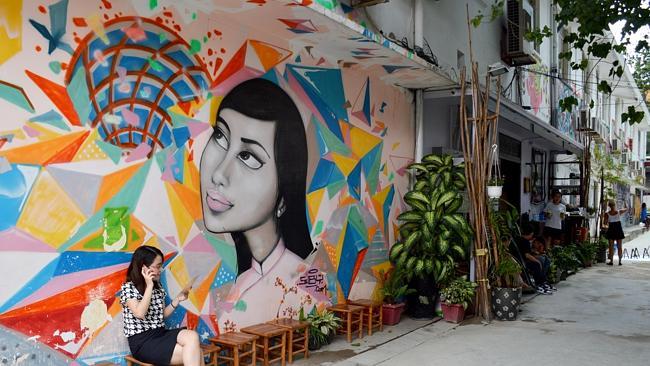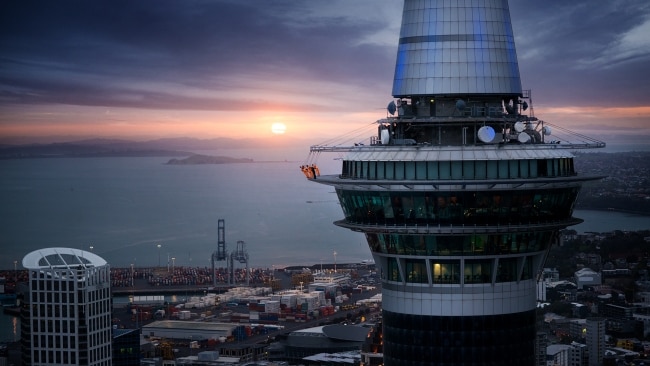3A Station, in Ho Chi Minh City (formerly Saigon) is an online innovative hub
Vietnam’s hip, young southern city is buzzing with ambitious entrepreneurs. Their positivity is infectious.

The path to making money in communist Vietnam is rigidly defined — work for a friend, take over the family business or join the grey ranks of government. So how do you explain to your traditional Vietnamese parents that you’re founding a digital start-up?
“I got them to watch The Social Network,” says Mike Tran, 31, chief executive of the Ho Chi Minh City-based start-up Ticketbox. The 2011 film charts the rise of Facebook from college dormitory to multi-billion-dollar business. Tran credits it for bringing his parents up to speed on the global tech economy. “They said, ‘Oh OK, this is real business.’ The movie did me a big favour.”
Ticketbox was the first company to offer digital bookings for tickets in Ho Chi Minh City (formerly Saigon) and does a booming trade with the city’s smartphone-savvy youth. More than half of Vietnam’s population is under the age of 35, and the nation has one of the highest rates of internet use in Asia, with an estimated 45 per cent of the population online. Tran says the digital buzz is rubbing off on the young. “People here are very entrepreneurial and they want to be their own boss. They are starting to do more innovative things.”
Entrepreneurship driven by technology is changing Vietnam apace, and the best spot to see the transformation is Ho Chi Minh City. This glittering southern hub of eight million people and 24 districts is a place where iPhones and Wi-Fi are becoming the work tools of choice, which is very different from the hammer and sickle of Marxism-Leninism. Co-working spaces, connected cafes and social media-driven creative meccas are springing up everywhere, fuelling new ways to make money.
We’re in Ho Chi Minh City to work on our own online business and the pace of the city is irresistible, fuelled by condensed milk-spiked cafe sua da and the honks of seemingly never-ending traffic. One morning, thanks to a local recommendation, we venture to 3A Ton Duc Thang, also known as 3A Station, opposite the Saigon River in the city’s central District 1. Here we find a collection of old French factory buildings has been converted into a vibrant creative space in which artists exhibit their work in galleries and trendy young Vietnamese lounge on sidewalks holding business meeting over tea.
It’s a scene that summarises Ho Chi Minh City today — a place where new ventures seem to open every moment. As a visitor to the city, it’s a hidden find and the perfect spot to soak up the local cafe culture
That night we shut down our laptops and head to the up-market Chill Skybar in the AB Tower in the centre of District 1. Ushered up in the lift and across the soft-padded carpet, we arrive at a bar where the wealthier Vietnamese come to unwind after a long day at work. Although a Wednesday night, it is heaving as hundreds of 20 and thirtysomethings fill the bar. They’re here for an event put on by a group called YES, Young Entrepreneurs in Saigon. As they sip cocktails, they swap business cards and talk about their latest start-up idea. The bar’s view is commanding, with the old French-style boulevards and parks below glowing with the reflections of billboards, skyscrapers and buzzing traffic.
Among the crowd we meet Germain Blanchet, a French expat who was drawn to the city to launch a high-end delivery start-up called MarketOi. “There are thousands of French here and lots are working on their own online businesses. It’s a much easier place to work than France,” he enthuses, laughing into his beer when I mention his own nation’s 75 per cent top rate of tax.
Mandy Nguyen, from the local venture builder Leapers, says Ho Chi Minh City’s low cost of living is the big attraction for start-ups, whether run by locals or expats. “It costs you less than $US100 ($139) to get your business up and running legally. And the cost to live here can be covered with $US10 a day.” She estimates there are more than 1000 start-ups and entrepreneurial businesses in Vietnam. She says most are in her city, although it’s a figure that’s impossible to verify as new ones start every day.
And it can be done quickly. Madox Thanh Hoang Nguyen is a fashion designer born in Germany to Vietnamese parents. He moved back to Ho Chi Minh City this year to create Ken-Ji, a three-storey cafe, fashion outlet and digital co-working space in District 1. Madox opened his business with French-Vietnamese girlfriend Anais Lacouture in just three months.
We sit down with him in his sleek minimalist cafe and chat over a few cups of strong local robusta coffee. “There’s a drive here, everything can be fast if you want it to be,” he says.
“It was a big step for me to come back to Vietnam, but it’s also natural, it feels good to be part of it. We want to create an artists’ community of original work and stay true to our own vision, not just what’s being done elsewhere.”
And though Madox’s shop in the centre of Ho Chi Minh City is full of experimental fashion with a starkly modern style, it still has a traditional Buddhist shrine in the foyer with burning incense to bring good fortune. “Our parents said if you’re going to have this shop you have to have this. No need to talk about it, just have it!”
But it’s not just the Vietnamese who are taking advantage of the local business market. Expats are moving to Ho Chi Minh to found start-ups too. Head to the collaborative space and cafe WORK Saigon, located in a colonial villa complete with swimming pool on Dien Bien Phu in District 3, and you can hear many languages being spoken, from English and French to Spanish and Mandarin.
Vietnam’s economy is seeing swift changes with multinationals such as Samsung moving their smartphone manufacturing operations from China to take advantage of lower costs across the border.
This rush of new business is changing Vietnam’s economic landscape and coming generations look set to enter a workforce where digital skills will be the most valued. The influence of the new industry and wealth is reflected in a brace of developments in old haunts across Ho Chi Minh City. A subculture of so-called hidden cafes has sprung up in battered old apartment buildings such as 14 Ton That Dam Street. The building is a creepy, abandoned ruin that almost looks like a horror film set but inside you’ll find a warren of cafes, shops and start-ups run by digitally connected entrepreneurs.
When we visit, the building is covered in laundry flapping in the afternoon breeze. Women dressed in traditional ao dai costume play cards at the base of the crumbling staircase. “Cafe?” they ask, and enthusiastically point upstairs. Inside the apartment block we find a men’s fashion shoot in full swing along the dimly lit corridors, with the modern 68-storey Bitexco Financial Tower, Ho Chi Minh City’s major landmark, gleaming through the windows.
We stroll to the centre of the city, to District 1, on a Friday afternoon. It is filled with young people strumming guitars, skateboarding and taking never-ending selfies on the pavements surrounding the city’s famed red-brick Notre Dame Cathedral near the leafy boulevard of Le Duan. A group of university students approach us and ask if they can practise their English. “Without it we cannot do business,” the leader of the group explains, who tells us he is from an agricultural province. I ask what he wants to do in life, and his answer is unequivocal. “I want to make a start-up.”
When I ask if he has an idea, he shrugs and smiles. “I’ll think of something.”


